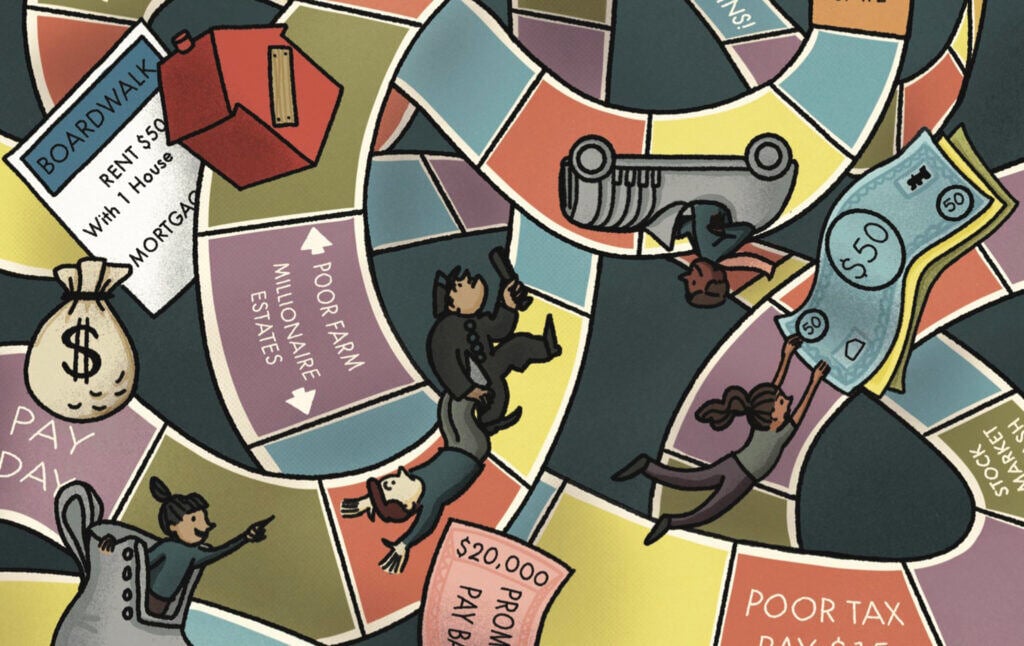
What Board Games Can Teach Us About Politics and Power
From Monopoly to Jacobin’s “Class War,” a well-designed board game can be a great way to explain how the world works.
For many decades, Monopoly’s makers lied about the origins of the best-selling game. In 2019, Hasbro released Ms. Monopoly, a special feminist edition of the game in which female players are paid more than male players (I am surprised this didn’t spark a segment on Tucker Carlson’s show). Instead of properties, players purchase items that women contributed to the invention of (“modern shapewear,” “retractable dog leash,” “bulletproof fest”). As the New York Times noted upon the game’s release, Hasbro claimed that the “game as we know it was invented by Charles Darrow, who sold his idea to Parker Brothers in 1935.” But it wasn’t. It was invented by a leftist feminist named Lizzie Magie.
By now, the story of Lizzie Magie is much better known than it was a few years back, and an oft-told “fun fact” about Monopoly is that it was originally meant to be anti-capitalist. Magie’s story has been told in a book, Mary Pilon’s The Monopolists. (Pilon said of Ms. Monopoly that “if Hasbro was serious about women’s empowerment, they could start by admitting that a woman invented the game.”) For those who haven’t heard it, the true story is that Magie patented a Monopoly-like game called The Landlord’s Game in 1903. In the 1930s, Darrow encountered a variant of Magie’s game, made some tweaks (like adding question marks on the Chance cards), and got himself a patent for “Monopoly.” He sold it to Parker Brothers and became the first millionaire board game inventor. Monopoly was a clear infringement of Magie’s patent, so in her old age she was paid $500 to relinquish her legal claim. After that, Parker promoted Darrow as the sole inventor of the game. “Maybe it was easier to market Monopoly with the Darrow myth than with the real story of a Quaker woman trying to demonstrate the evils of land ownership,” speculates one writer for a game review magazine.
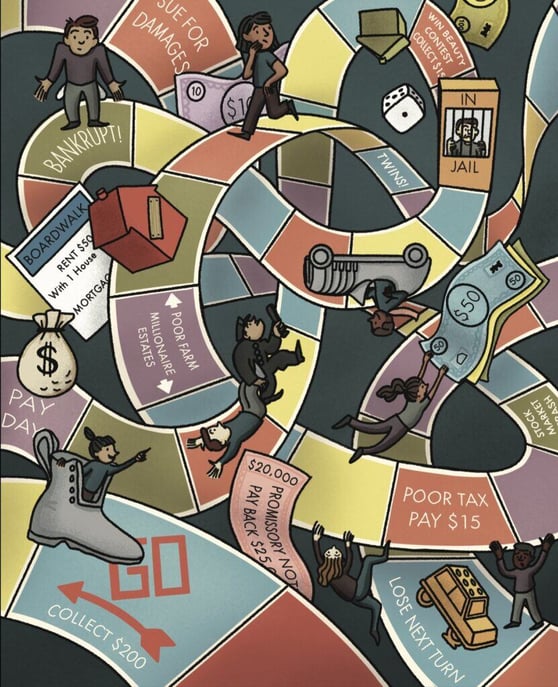
The Landlord’s Game was an attempt to illustrate how landlords are economically parasitic, in order to argue for the imposition of a land tax. Magie was a devoted follower of the economist Henry George, whose Progress and Poverty was one of the bestselling books of its era. Magie saw The Landlord’s Game as a teaching tool, citing the pedagogical effect it would have on 9- or 10-year-olds who played it:
“[T]he little landlords take a general delight in demanding the payment of their rent. They learn that the quickest way to accumulate wealth and gain power is to get all the land they can in the best localities and hold on to it. Let the children once see clearly the gross injustice of our present land system and when they grow up, if they are allowed to develop naturally, the evil will soon be remedied.”
It didn’t quite work out that way. But looking at an old Landlord’s Game board, we can see just how ingenious Magie was in her attempt to convey a straightforward economic idea by means of a board game.
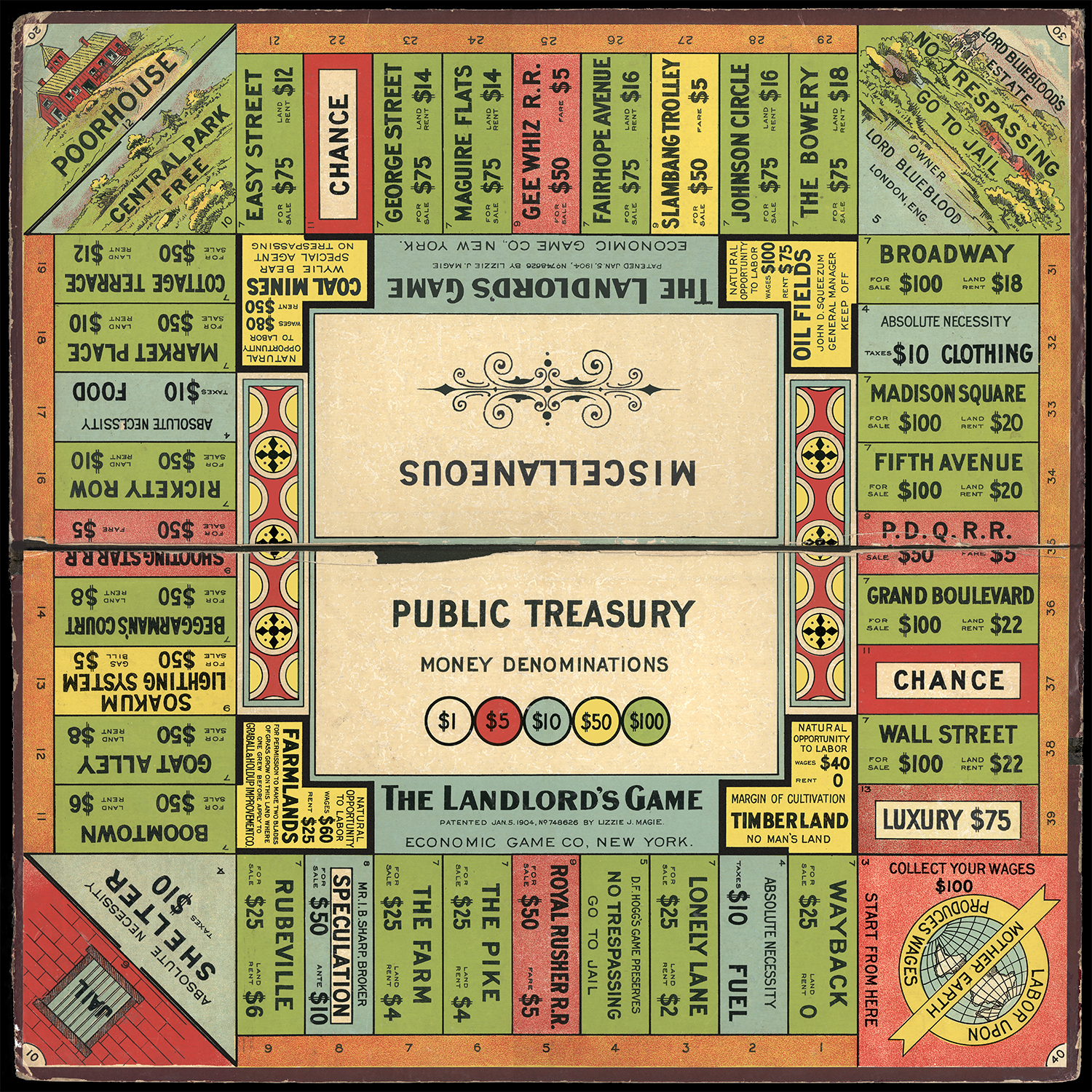
The structure is familiar from Monopoly. But the educational aspects, and the underlying point, are much clearer. People get wages (“Labor Upon Mother Earth Produces Wages”), and as they go through life, they have to pay various kinds of expenses (“Fuel,” “Food,” “Clothing,” etc.). They must pay gas bills and trolley fares, and most importantly, rent. The game shows the power that landlords have, and how renters have no choice but to fork over their wages to those who own the land and the structures on it. Importantly, the game demonstrates how even under conditions of “equal opportunity” (everyone starts with the same resources), in a competitive system, one person can come to dominate everyone else. As a 1925 version’s rules explained, the game “ is designed to show the evil resulting from the institution of private property,” because:
“At the start of the game, every player is provided with the same chance of success as every other player. The game ends with one person in possession of all the money.”
It’s not just a board game, but a very effective argument. Magie was not trying to create an entertaining diversion, but a very clear demonstration of an important dynamic in a capitalist economy. Magie’s work was even picked up by some critical business professors as a teaching tool (including the socialist Scott Nearing, then teaching at the Wharton School). Sadly, not only did a man rename the game and steal all the credit (and get all the money), but Magie’s entire point was lost.
There are now plenty of news stories and blog posts about Lizzie Magie, pointing out the interesting ironic fact that a game about getting rich was created by a leftist trying to make a point. It’s heartening that Magie is finally getting some of her long overdue credit. But we should also take her actual point seriously. Monopoly, and the Landlord’s Game before it, show the instability and ever-increasing unfairness of a capitalist economy, whereby those who gain control over what everyone else needs in order to survive eventually develop an almost complete ability to extract wealth from others and further enrich themselves. Magie’s critique of a free market economy with privately owned land, articulated through the game, is a powerful one. (Interestingly, Magie produced an alternative version of the game in which the wealth created by all is distributed equally. The Wall Street Journal gloats that this “excited no one” while the competitive version was “fun.”)
We might conclude that board games just aren’t a great way to teach people anything important, other than how to play board games. Milton Bradley created his “Checkered Game of Life” in 1860 as a “game with a purpose,” which would teach “a lesson of success through integrity and right living.” “Intemperance” squares would lead to “Poverty” and “Gambling” would lead to “Ruin” while “Perseverance” and “Ambition” could get you to “Happy Old Age.” Bradley’s “Life” did not successfully produce a moral revolution in the country, though a version reworked in the 1960s would become one of the best-selling board games of all time.
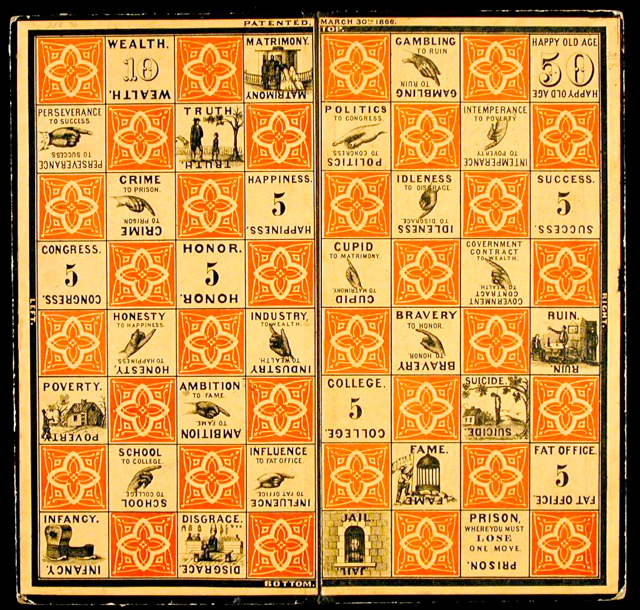
It’s easy to see why Magie and Bradley did think board games would be useful teaching tools, though. A board game offers a kind of simplified model or abstraction of reality in which certain features and rules are made essential. Chess is a kind of abstraction of war (early Indian forerunners of chess had infantry, cavalry, elephants, and chariotry). In Battleship, all of the complexities of naval warfare are reduced to finding coordinates, aiming torpedoes, and sinking ships.
Abstract models, in which certain features of a system are picked out, can be profoundly useful in understanding how the system works. By simplifying the economy to the flow of dollars from employers to workers to landlords’ pockets, we can perceive something important about the economic world even if the actual world is much more complicated. But abstractions can also be dangerous, because if our minimalist mental model of the world excludes features that are actually critical, we can lose touch with reality rather than deepening our understanding of it. Think of how Prince Harry infamously wrote that he saw dead Taliban members as “chess pieces removed from the board.” The Taliban pointed out on Twitter that these were also people with families. But if war is conceived of as a kind of chess, with the people merely so many pawns and knights, the humanity of the “pieces” simply has no place in the system of understanding.
But if you want to show how strategic actors navigate a set of rules, games are certainly a great way of demonstrating it clearly. Eric Thurm, in an article for Topic, recounts a long history of socially conscious board games, including games that have
tried to show how racism works and a game called “Who Can Beat Nixon?” (Thurm himself actually wrote a political game for this magazine once called “Civility! The Game of Reasonable Change Within Carefully Delineated Boundaries.”)

It’s therefore quite possible to create a Marxist board game, because the core theory of Marxism involves competitive actors jockeying for power in a system with a certain set of rules. In 1978, NYU politics professor Bertell Ollman was able to provide a pretty convincing introductory demonstration of Marxist theory in his board game Class Struggle, which sold over 200,000 copies.
Each player in Class Struggle is a “class,” whether workers or capitalists (the “major classes”) or students, small businessmen, farmers, or professionals (the “minor classes”). The rule book is a delight and contains passages like:
- “‘Class Struggle’ reflects the real struggle between the classes in our society. THE OBJECT OF THE GAME IS TO WIN THE REVOLUTION . . . ULTIMATELY. Until then, classes—represented by different players—advance around the board, making and breaking alliances, and picking up strengths and weaknesses that determine the outcome of the elections and general strikes which occur along the way.
- “There are six Confrontation Squares—Life in the factory, two Elections, two General Strikes (when all the workers lay down their tools) and the Revolution. If either Major Class or its allies lands on a Confrontation Square, it has a choice whether or not to call a Confrontation. Non-allied Minor classes cannot call a Confrontation, and only the Major Classes (not even their allies) can call the final Confrontation, which is the Revolution. In a Confrontation, each side adds up its assets and debits (allies are counted together), and the side with the highest number of assets after debits are subtracted wins. IN THE CASE OF THE ELECTIONS AND GENERAL STRIKES, WINNING THE CONFRONTATION SECURES THE VICTORIOUS MAJOR CLASS THREE FREE THROWS OF THE DICE, improving in this way its position in the overall Class Struggle. Rule 6 regarding double numbers does not apply to these three throws. IN THE CASE OF REVOLUTION, WINNING THE CONFRONTATION IS WINNING THE GAME.”
Players cannot choose which class they want to play as, because “in real life, this is usually determined by the kind of family into which one is born.” Thus they must roll the dice to simulate the “genetic lottery” and determine who they are. And they’d better not show any sympathy for the other side, because as one card for capitalists says: “You are caught feeling sorry for the Workers. Victory in class struggle comes to people who think about their own class. Miss two turns at the dice.”
Ollman put some humor into the game. The box shows Karl Marx arm-wrestling Nelson Rockefeller, and Chance cards could say things like: “Yesterday you shook hands with Republicrat Senator Kennewater, and you believed him when he said he is the workingman’s candidate. Lose 1 asset for being so gullible.” Or: ““Together with your fellow workers, you have occupied your factory and locked your boss in the toilet. Capitalists miss 2 turns at the dice.”
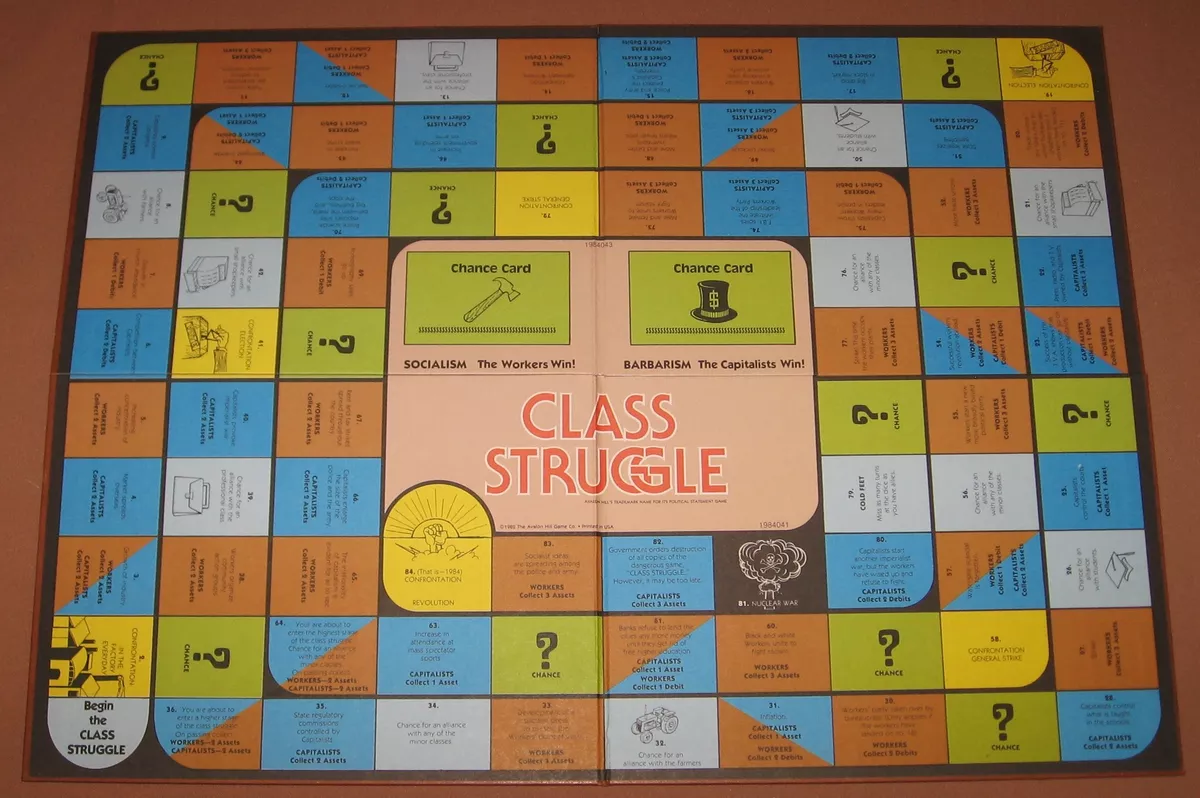
But Ollman was dead serious that the game should be a way of teaching left politics. “There is a class struggle,” he said, and “there is a great need to help young people understand what it is, how it works, and where they fit into it,” but “they are certainly not going to learn any of this from the mainstream media or in most of their formal education.” Hence Class Struggle: The Board Game.
I like this idea, in part because I think leftists should always be thinking of ways to make our ideas more accessible and intelligible to people, and a board game is a useful way of making them both simple and entertaining. It was heartening, then, to see socialist magazine Jacobin do a kind of 21st-century twist on Ollman’s game last year, when they produced Class War, with a similar division between capitalists and workers, who each compete to achieve dominance. (Unlike Ollman’s game, Class War involves cartoon animals, including a Bernie Sanders stand-in called Birdie Feathers.)
The Jacobin game quickly went out of print, which is a shame, because I do think games can be a useful teaching tool. They’re most useful for teaching about conflict, probably, since board games are almost always competitive. (There are some cooperative board games, though I’ve yet to play one that isn’t boring, the worst I’ve played being the insipid “Rainbowland,” in which “players work together collecting colored raindrops in their buckets to build a new rainbow.” I am told that Pandemic is fun, although perhaps a little more depressing post-COVID. ) Marxism, or the conflict of interest between landlords and tenants, lends itself well to a board game. So does war.
The challenge is to make games educational without making them didactic, and I think most games that actually stand a chance of imparting any new understandings in their players are going to have to sacrifice some entertainment value. Perhaps not, though. A new “class struggle” game called Hegemony, released this year, has received some positive reviews from board game fans despite coming with a 40-page explainer guide giving the rundown on neoliberalism and the IMF. This is because in Hegemony, things like this can happen:
“If the State has taken on more loans than the current Fiscal Policy allows, the International Monetary Fund intervenes. This temporarily blows up the game; any proposed bills get tossed, wages fall to their lowest allowable level, policies are reset, the State loses a bunch of points.”
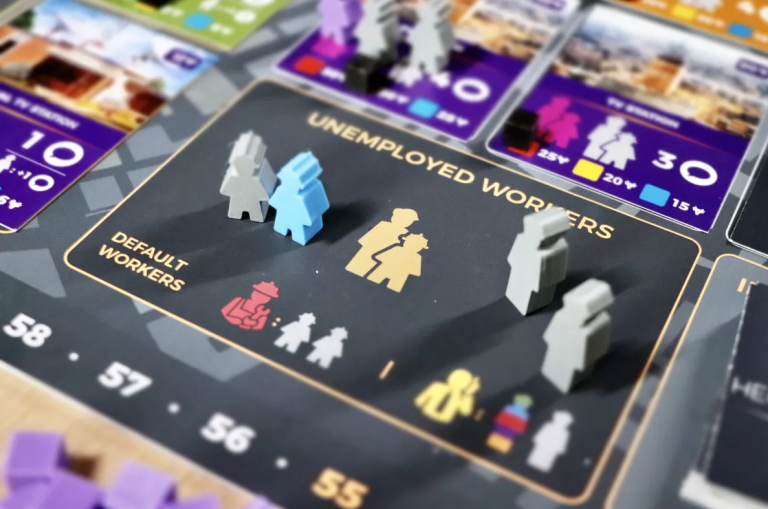
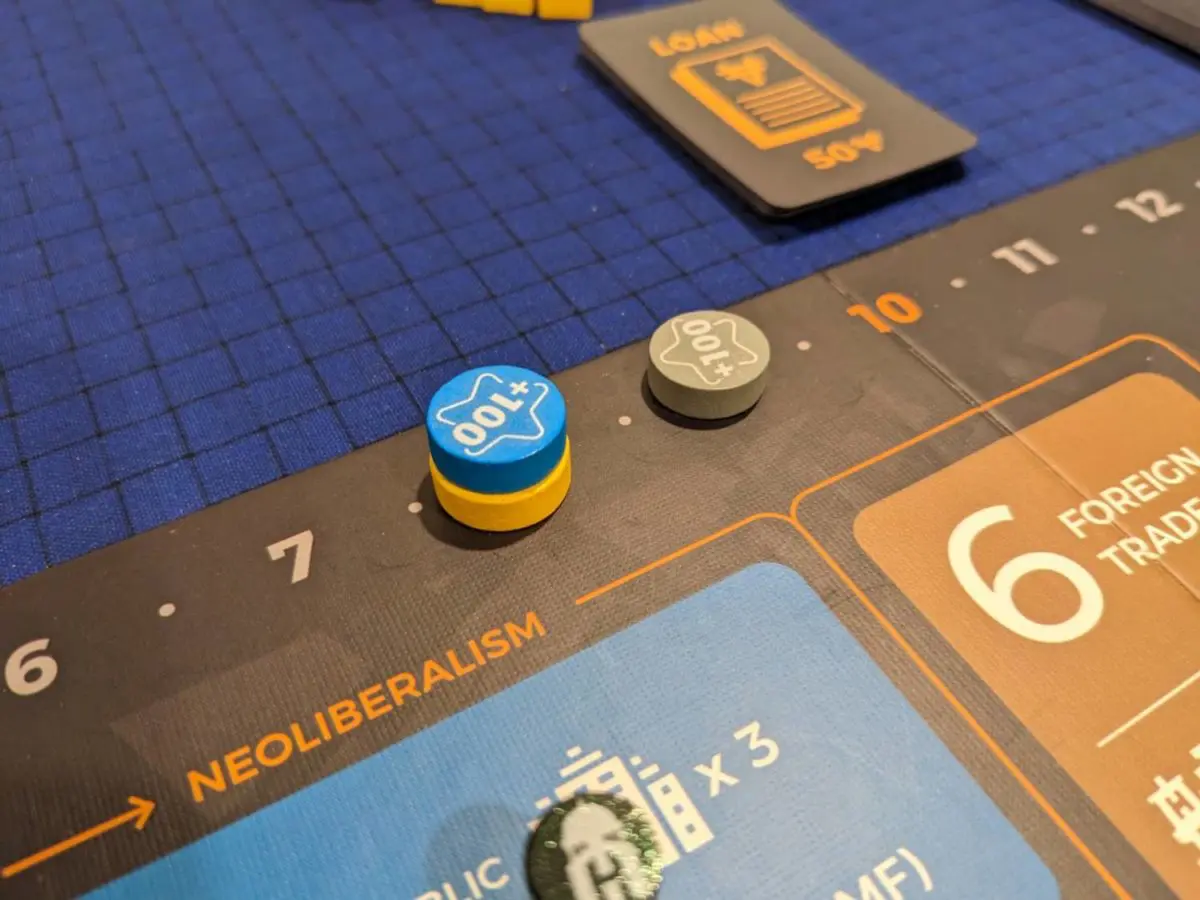
There are other contemporary games with leftist themes. Red Flag Over Paris is a “ two-player card-driven wargame depicting the two months of intense confrontation between the Communards and the government in Versailles during the 1871 Paris Commune,” in which you must “win the hearts and minds of the French population.” There is also “Bloc By Bloc: the Insurrection Game,” described as “a semi-cooperative tabletop game inspired by 21st century protest movements, riots and popular uprisings” in which “each player controls a faction of revolutionaries—Workers, Students, Neighbors, or Prisoners—fighting against the State in the streets of a city that change with each game. Build barricades, clash with riot cops, occupy districts, loot shopping centers, and liberate the city before time runs out and the military arrives!” If that’s not fun, I don’t know what is.

In the United States, our most popular board games have long tended to be a bit, well, frivolous. I don’t just mean the infamous Donald Trump board game about real estate transactions (which, yes, featured “Trump cards,” and was also apparently very dull). I also mean that our games tend to be things like Candy Land and Mouse Trap and Clue, with little relevance to the real world. The “Eurogames” that come from across the Atlantic, on the other hand, feature subjects that are a little more mundane or quotidian, like building rail networks (Ticket to Ride) or developing the textile industry (Brass). I’m not sure that actually makes them better, or means that they teach you anything of value. I don’t know how much anybody has ever learned from a board game that is useful beyond the game. (Being incredibly smart about chess, for instance, doesn’t mean you’re smart about anything else, as the case of Bobby Fischer infamously proved.)
But those of us interested in finding ways to make new political and economic ideas intelligible to a broad audience have a lot to learn from Lizzie Magie. The most obvious lesson is: The capitalists will screw you, so keep a tight hold on your patents. But the Landlord’s Game is also a fascinating experiment in how an economic argument can be put into a playable format that people actually enjoy. The jury is still out on the question of how much games can actually teach, but I hope that experiments in creating left board games continue. I enjoyed Mouse Trap as a kid, but I wish I’d been playing Class Struggle instead.




